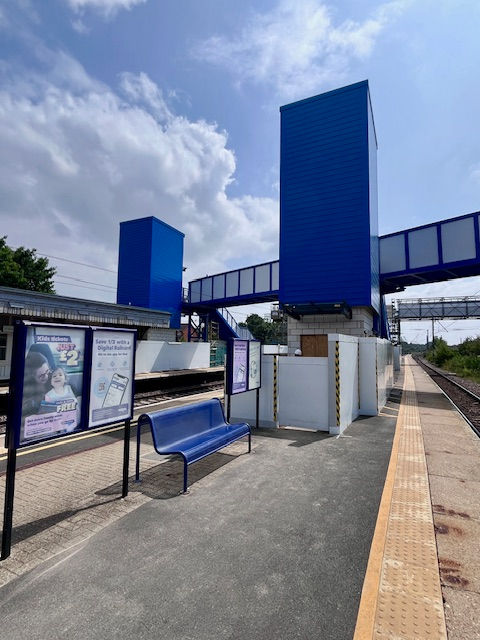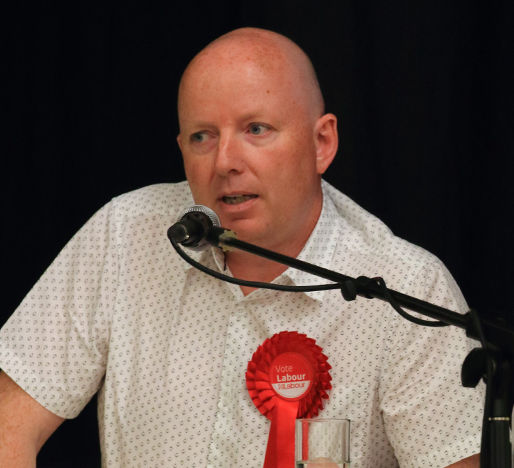Actions not words needed on rail accessibility
- Julian Vaughan

- Apr 30, 2024
- 5 min read
There is much to unpack from yesterday’s House of Commons Public Accounts Committee hearing discussing UK rail reform. The Committee heard from the top brass in Network Rail and the Department for Transport (DfT) about their plans to transform the governance of the UK railways, primarily through the Great British Railways transformation team – although there were several other committees and boards mentioned.
What the answers given to MPs did reveal is their abject failure to deliver for people with disabilities, who are being disabled by our railway network. In what at least was a frank admission, Andrew Haines the CEO of Network Rail told the committee that the fundamental reasons they were not delivering for passengers that require assistance were:
Selecting the wrong stations for accessibility improvements
Lack of understanding (by network Rail) of the scope of schemes
Getting too involved with stakeholders, resulting in an increase in costs
They were not good at managing smaller schemes (such as step-free access)
Andrew Haines’s evidence expanding these four bullet points is below in a two minute clip. It is worth a listen!
Andrew Haines, Network Rail CEO speaking at the Public Accounts Committee hearing 29th April 2024
As Andrew Haines has been CEO of Network Rail since 2018, these are quite some admissions, although I did admire his openness. Some people, after five years of failure, may have wondered if they were up to the job and considered their position.
Funding for improvements at Luton station (and several others) was deferred for 5 years by the coalition government. I was pretty shocked to hear “too much engagement with stakeholders” being used as an excuse for a lack of progress and an increase in costs. This will be a surprise to any accessibility campaigners.
I certainly agree with his assertion that Network Rail is not good at managing smaller schemes. In relation to the step-free access scheme for Biggleswade station, we as the Bedfordshire Rail Access Network team, are the only ones who have been at the table since the start of the project, and in that time we have seen six network Rail project teams.
Earlier in the session Conrad Bailey said that they had created a ‘Rail Reform Board’ and that this board had the right people around the table with very clear accountabilities. Later on, Sarah Owen MP asked about this Board and who sat on it, specifically if there were any attendees with knowledge of disability or rail accessibility or worker representation (i.e. trade unions). Conrad Bailey said “no”, but he was very quickly interrupted by Andrew Haines who mentioned Stephen Duckworth who is a Non-Exec Director of Network Rail, but as far as I can see, isn’t on the Rail Reform Board. So, there is no representation from the Trade Unions or anyone with accessibility expertise, on what Conrad Bailey said is a Board that has all the right people on it – and a Board that will be a very important component of UK Railways governance. The short clip regarding this is below.
Sarah Owen asking Network Rail/DfT bosses about the Rail Reform Board at the Public Accounts Committee 29th April 2024
The Network Rail/GBR team then sang the praises of their latest station Accessibility Audit which will inform future decision making and spoke about an upcoming ‘National Rail Accessibility Strategy’ consultation – yet another consultation – the results of which will be available at the end of this year. This lack of any action was again picked up by Sarah Owen MP, who gave the example of Leagrave station within her constituency. The full clip regarding this is below. *Full disclosure, I have worked with Sarah on the campaign for lifts at Leagrave and (successfully) pitched to Luton Council for funding for the feasibility report mentioned in this clip.
Sarah Owen MP discussing Leagrave station
As one example of the state of accessibility on the UK rail network, Leagrave station has an accessible toilet on the platform (it has four platforms) that hardly trains stop at.
I certainly raised my eyebrow when they discussed the issue of the recent ticket office consultation. Conrad Bailey from the DfT said that they had learned a huge amount from the ticket office consultation, although it was clear the ‘industry proposals’ (on ticket office closures) were not going to be acceptable – which is why Ministers didn’t take it forward. Really? I think everyone in the rail industry knows that it was the DfT that was the origin of these deeply unpopular proposals, aided and abetted by the Rail Delivery Group.
Conrad Bailey discussing the Ticket Office consultation
It is clear that the DfT sees the ticket office closures as ‘unfinished business’ and during this session they talked about not reaching their cost savings target (£2.6 billion) set during the 2020/21 spending review due to not being able to drive through “some elements of workforce reform”. Further to this they also talked about new ways of working, such as ‘welcome points’ for passengers to meet staff. Now, ‘meeting points’ are already a requirement, as set out in the Office of Rail and Road’s Accessible Travel Policy (ATP) guidance for Train and Station Operators, so this new initiative seems to indicate an absence of ticket offices. Campaigners for a fully staffed, safe and accessible railway will have to keep a very close eye on this area.
The wide ranging session also covered the £36 billion ‘saved’ from the axing of HS2, although it was made very clear that this money won’t be available in a lump sum, but spread over a number of years – 11 years was the timescale I heard on when re-listening to the session. Also discussed was the ‘Passenger Revenue Optimisation Plan’ which included the themes of providing: punctuality, a seat on a train, a fair fare structure, and if something goes wrong a sense that you have got someone or something “looking out for you”. I refer to ‘something’ as they discussed the provision of an App or announcements, as a potential alternative to a member of staff physically present. I was not reassured by this.
Finally, I have tried to be as brief as possible, there was a discussion about who exactly the rail industry bosses are engaging with. It became very clear that there has been minimal engagement with rail staff on their proposed rail reforms. The Network Rail/DfT bosses were asked when was the last time either they or a Minister had met with the Trade Unions, cue tumbleweed drifting across the committee room. As Sarah Owen MP stated later in the session, the DfT seems prepared to talk to every other stakeholder in the rail industry, bar the trade unions. It was confirmed there is no prohibition on the DfT meeting trade unions. The clip regarding this issue is below.
The DfT bosses being asked about their engagement with Trade Unions
Overall and sadly, I was unimpressed by the evidence from all the witnesses to the committee and I have little confidence that they are committed to either an accessible rail network or a fully staffed railway. It is very easy to say that accessibility is a top priority, although they were even pretty equivocal about that, but it is actions, not words that disabled people need from those in the rail industry. We have all waited long enough.
Witnesses:
Dame Bernadette Kelly, Permanent Secretary DfT
Conrad Bailey, Director General, Rail Strategy and Service Group (DfT)
Andrew Haines, Chief Executive Network Rail
Anit Chandarana, Interim Director General, Rail Infrastructure, DfT
You can watch the full session here: https://www.parliamentlive.tv/Event/Index/4aaf7b95-90ed-49bc-a350-a0174dc1abd8#player-tabs
Further Reading: Rail Reform: the rail transformation programme, National Audit Office DfThttps://www.nao.org.uk/wp-content/uploads/2024/03/rail-reform-the-rail-transformation-programme.pdf
Office of Rail and Road: Accessible Travel Policy, Guidance for Train and Station Operators https://www.orr.gov.uk/sites/default/files/2021-03/September%202020%20ATP%20Guidance%20final.pdf
Julian Vaughan
30th April 2024






Comments